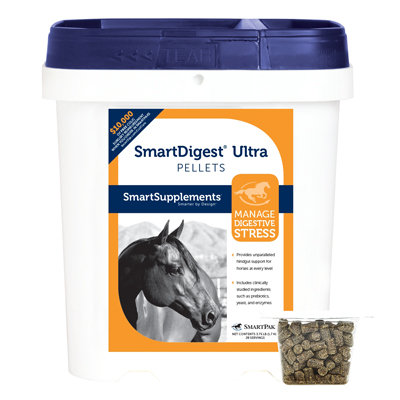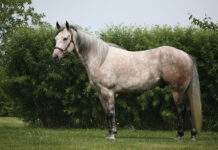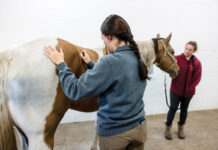
There can be a lot of confusion between your horse’s foregut health and hindgut health. While the entire process of breaking down food and absorbing nutrients is all commonly referred to as “digestion,” the organs in the foregut and hindgut have very different functions, and each area has unique health concerns.
Horse Foregut Health
When developing a plan to maintain your horse’s gastric health, consider his diet along with other management strategies. Focus on hay and other forage, ideally allowing your horse pasture grazing or free-choice access to hay 24/7. Large grain meals have been identified as a risk factor for gastric upset, so feed only the minimum amount of grain (if any) your horse needs to maintain weight and performance. Ensure he gets his recommended protein, vitamins, and minerals with a ration balancer.
You can also provide additional support for overall gastric health with a supplement that supplies ingredients such as calcium and magnesium to help neutralize gastric acid, as well as glutamine, glycine, and soothing herbs to support a healthy stomach lining. SmartGut Ultra offers these ingredients to provide the “ultra” in gastric support.
Horse Hindgut Health
The term “hindgut” refers to the section of the GI tract containing the cecum and colon. The hindgut’s primary digestive function is fermentation, which makes it responsible for digesting the complex carbohydrates or fiber your horse eats, including all of his forage (hay, pasture, and other roughage).
Much like the foregut, the hindgut was built for constant grazing, and therefore, constant digestion. However, when large meals are fed infrequently, an unhealthy cecum and colon can develop, resulting in excess gas, impaction, loose stool, and other types of digestive upset. Even more concerning, digestive upset can lead to colic, which can be fatal.
While nothing can prevent occasional digestive upset, working with your veterinarian to ensure your horse is being managed and fed appropriately may reduce his risk level. One approach your vet may recommend is daily support from a supplement to help your horse cope with digestive stress.
When choosing a supplement that targets the cecum and colon, look for a formula that provides comprehensive support for a healthy, balanced hindgut from ingredients, such as probiotics and prebiotics; yeast, which has been demonstrated to improve fiber digestion and assist in adjusting to feed changes; and enzymes, which have been shown to increase proper digestion of starch in the foregut. SmartDigest Ultra Pellets provide unparalleled hindgut support for every horse, to help maintain GI balance and manage digestive stress caused by hay fluctuations, training, travel and more.
Read more tips from SmartPak.






